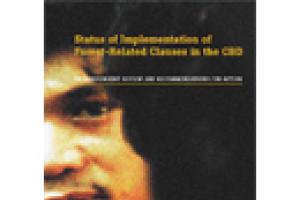Women around the world suffer greatly. They suffer from all kinds of situations such as wars and sexual discriminations by men. Children suffer as a consequent of their sufferings. In many cultures, men look upon women as inferior and as such they are forced to do all the heavy and hard work.
Ninety percent or 4.5 million Papua New Guineans depend on the forests for their livelihoods and have done so for hundreds and even thousands of years. The forests provide food, building materials, medicine and a source of culture and spirituality for the people.
Papua New Guinea
Other information
30 June 2003
Misima Island is situated in the Louisiade Archipelago in Milne Bay Province, Papua New Guinea. The island is 40 kilometres long and 10 kilometres wide at its broadest point, and is covered in lowland hill rain forest except for the coastal zone and the foothills which have been cleared for cultivation and replaced by woodland.
Other information
22 June 2003
Briefing Paper prepared by Lee Tan, Australian Conservation Foundation/Friends of the Earth Australia
“We, the landowners are developing and will continue to develop OUR LAND on our own term. We therefore sternly warn all those parties involved in wanting to use OUR LAND for oil palm to STAY OUT! Any attempt to bring oil palm on our land will be strongly resisted”
Extract from a newspaper advertisement put out by a group of landowners in PNG, February 2003
Oil Palm in PNG
Bulletin articles
3 April 2003
Official figures from the PNG Forest Authority show that between 1993 and 2001 a total of 20 million cubic meters of logs were exported from PNG. If all those logs were laid side by side they would stretch for over 1,000 kilometres. If they were laid end to end they would stretch for 7,000 kilometres.
In the last 10 years most of the logs have been taken from West New Britain but now those forests are almost gone. Now the logging companies in PNG --most of them Malaysian-- are getting most of their logs from Western and Gulf Provinces.
Bulletin articles
4 March 2003
Several PNG and Pacific Groups, Australian Groups and International Groups have published a sign-on letter addressed to the Prime Minister of Papua New Guinea, Sir Michael Somare, raising their "deep concern and increasing frustration over the current state of governance in Papua New Guinea's forests sector and its debilitating impact on the economy and security of the Nation", presenting evidence that uphold their concern, and calling on the government to act.
Bulletin articles
2 January 2003
The richness of PNG's forests is well known, and so is their level of destruction due to industrial logging. This unsustainable activity --in most cases related to high levels of corruption-- has provided large revenues to corporations while at the same time has left local communities without their sources of livelihoods.
Local Non Governmental Organizations --organized under the Papua New Guinea Eco Forestry Forum-- together with local land owners are pushing forward another model of forest management (see WRM Bulletin 44).
Bulletin articles
7 November 2002
Landowners of Maisin and Wanigela customary lands, in the Collingwood Bay area of Oro Province, have something to celebrate.
In May 2002, the Waigani National Court returned customary land which had been leased to the State in early 1999 under a lease-lease back agreement by Keroro Development Corporation, a local landowner company. The plan was to clear the area and plant oil palm trees. The land concerned comprises 38,000 hectares of rich volcanic soil with an extensive forest area.
Bulletin articles
12 July 2002
There should be more literature on the broken promises of the logging industry. When those companies arrive in a country, they try to entice the local people with arguments like that their operations will bring jobs and training for them.
Bulletin articles
15 April 2002
Papua New Guinea, widely recognised as a country with a great diversity of forests, is now facing the depletion of its forest resources. An Independent Forestry Review identified that 7 million hectares of forests have been allocated for large-scale commercial logging.
Other information
18 March 2002
Commissioned by the Global Forest Coalition
This report is based on 21 country case studies, including Australia, Brazil, Cameroon, Canada, Chile, Colombia, Czech republic, Ghana, India, Indonesia, Kenya,Malaysia, the Netherlands, New Zealand/Aotearoa, Papua New Guinea, Russia, South Africa, Suriname, Uganda, United Kingdom, and Uruguay
Bulletin articles
20 February 2002
Ninety seven percent of the land area of Papua New Guinea still is customary land owned by the people, who voluntarily give 3% to the government to build schools and other public buildings. This lush land with more than 700 recognised culturally and physically distinct peoples, each with their own language and traditional culture, used to have traditional landowners exercising sustainable forest management with little interference from outside.
Bulletin articles
21 January 2002
Mining operations in Papua New Guinea (PNG) are part of the IMF backed policy which opens the country to foreign investments for the unsustainable export-driven exploitation of natural resources. The serious record of mining activities includes flooding of forests and homes caused by the dumping of waste rocks and levels of mercury in the Ajkwa river four-times higher than the maximum allowed of 0,001 mg/l (WRM bulletin 7, December 1997).


